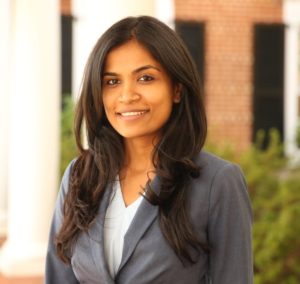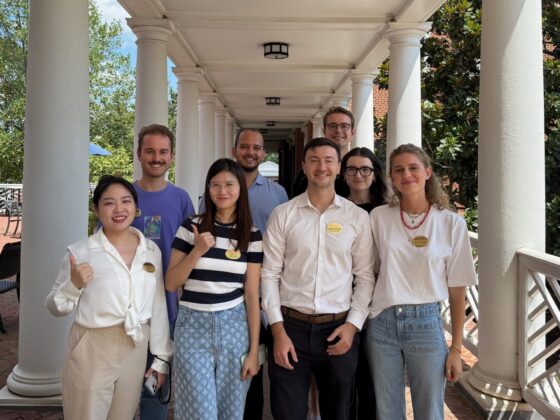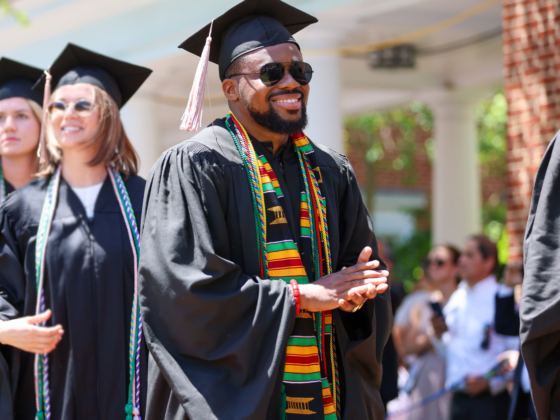By Anelle Mensah
Pragati Khara is currently a second year MBA student from Mumbai, India, graduating just a few days from now. She attended UT Austin and received her Bachelor’s degree in 2009. Prior to enrolling at Darden, she worked as a teacher through Teach For America in Houston, an education administrator for a charter school in NYC, and a Manager for Strategy and Impact at Teach For India in Mumbai. Pragati served as a Section Representative for Diversity, a VP of Events for both the Consulting Club and Education Club, and on the board of the Business & Public Policy Club during her time at Darden.
Pragati has traveled to various countries through Darden’s global academic programs, namely Darden Worldwide Courses (DWCs). In the fall of 2016, she traveled to Uganda on a global consulting project and in March 2017, Pragati traveled to Costa Rica on a DWC learning about the business practices that exist, the role of sustainability, and the people who drive the booming sectors within the country. She took some time to reflect on these experiences:
How did you learn about Darden and why did you decide to attend the school?
When I was researching business schools, I wanted to focus on the case method because I knew that would push me in my own development. Darden came up as one of the top schools for case method and that’s when I looked into it more. Even though I was working abroad at the time and didn’t have a chance to visit, what I read online about its strong teaching and close community motivated me to apply.
Why did you decide to participate in the Costa Rica Darden Worldwide Course and what were some lessons that you took away from it? What was most surprising to you about business practices in Costa Rica?
The Costa Rica course had a strong element on sustainability and this is something that really piqued my interest. As a small country, there are many things it has been able to accomplish for its development relative to Central/Latin America, and I wanted to understand the work behind that. In addition, having never taken a class with Melissa Thomas-Hunt before, I wanted to use this opportunity to get to know another wonderful Darden professor better!
The large and growing IT sector in Costa Rica surprised me. People always view tourism or agriculture as what makes Costa Rica’s economy, but it’s also highly sought after by a lot of international companies for IT services etc., due to English proficiency and its proximity to the US.
Why did you choose to go work on the global consulting project? What were some things that you learned about Ugandan business and culture that you did not know before?
I wanted some hands-on experience at Darden where I would help solve a problem that is impacting people in another country. Despite having traveled to around 30 countries before, I had never been anywhere in the continent of Africa prior to this trip. Given that Africa is such a large and diverse part of the world, I wanted to challenge myself and explore a region that was new to me. In addition, the project in Uganda focused on education and since this was relevant to my pre-Darden background, I was excited to work on it. After my trip, one thing that stood out to me was how sincere the people are (especially our clients) and how much of a gap there is between their abilities and the available resources.
How have your Darden global experiences impacted your world view? How do you plan to integrate what you’ve learned into your future career path?
Both my international experiences at Darden have given me a lens into work culture abroad and I’ve realized that at the end of the day, people are people, no matter where you go. The end goal for most of us is to be successful and provide for our families, whether you live in Uganda or the United States. Our ability to provide essentials and comfort to our families, and to make them proud, is what takes priority. Humans will all work hard toward doing that if provided with the right means or resources for being successful. In my future career path, I will always remember this and know that even if someone on my team comes from a very different place than I do, ultimately we have many shared goals and hopes. I will leverage these to create unity and a strong team culture.
Why do you think it is important for Darden students to have global experiences?
In today’s time, it’s impossible to be a business leader without also being a global leader. No matter where you live or work, you will inevitably interact with someone who is not from your culture or country. Global experiences help you understand the way things are run outside of your own bubble and they help you step out of your comfort zone. Most importantly though, they help build empathy and this is something the world needs now more than ever!
What is next for you after Darden?
After Darden, I’ll be headed to Houston to work as a Consultant at BCG. My long term goal, though, is to return to the education field.




